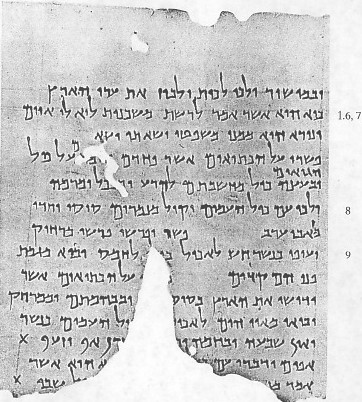
The Pesher to Habakkuk
Page 3
Chapter 1:6 to 9

It will be noticed that a good bit of the text is lost in the lacuna at the bottom of the page,
An interesting addition is the word "ha-goyiym" (the nations). It is inserted by an editor above the first word in Line 5. This is with in a pesher and not an addition to the text of Habakkuk. It is the spelling of this word that is interesting since an aleph is added to the body of the word. The Pesher of Habakkuk consistently spells "goyiym" without the aleph thus this editing is probably not by the original scribe..
Verse 6 is continued on this page.
Habakkuk 1:6
Beginning with the 5th word in the 2nd line "le-resheth" (to possess) the last 4 words of the verse follow and the last word in the line is the first word of verse 7. The translation here is "to possess areas that are not his." There are two partial letters more in this verse to be noted in a repetition of part of the verse below.
Because, behold, I am raising up the Chaldeans that bitter and impetuous nation, who are walking through the extent of the land to possess areas that are not theirs.
The word areas or habitations is "mishkanoth" dwelling places, neighborhoods. The word "mishkan" is the word translated "tabernacle" (dwelling place of the shekinah).
Habakkuk 1:7
This whole verse is intact beginning with the last word of the 2nd line and extending to the end of the next line which ends as a paragraph. Notice the added waw as vowel in the first word in the verse. Otherwise the verse in the Pesher is the same as that above
They are dreadful and terrible and their judgement and pride proceeds from themselves.
Habakkuk 1:8
In the Pesher this verse begins with the 5th word in the line located by the numeral 8 in the right margin. Here "qat" instead of "ve-cal" is the first word which means swift or light weighted. The verse continues through the 2nd word in the next line. The first word in that line (wolves) has an editorial correction because the scribe left out the zayin and it is edited above the line. The two words mean "evening wolves." This is followed by a spatium and what looks like "pesher" but it is not a pesher but is actually the continuation of the verse. The next word after "evening" is "o-pasha" (they spread) and a scribe may have mistaken the configuration for pesher and added the spatium and written it which is similar without the waw. Then the next 3 words continue the verse describing the horsemen leaving out one word "veyabo'u" (and they come) then the verse continues on the next line where the first 4 words complete the verse. "They fly like and eagle hastening to eat."
Their horses are lighter than a leopard and more alert than the evening wolves. And their horsemen spread themselves. Their horsemen from far off fly like an eagle hurrying to eat.
Habukkuk 1:9
This short verse is split up by pesher. The verse begins immediately following the last word of the last verse with the 5th word is the line marked by 9 in the margin. The first word in this verse is partially obscured by the top off the lacuna. A good bit of "kolah" (all of them) can be seen and continues through the next line to the 6th word in the verse "qadimah" which is fem. but the Pesher has the same word (east or east wind) in masc. form. This is followed by a spatium and the word pesher would be in the lacuna. The last two words in this verse are actually the last words on this page. You can see "sheviy" (captivity) and the word before it is the remnant of "ke-chol" (as sand) only part of the waw and lamed are able to be seen. The rest of the verse would have been in the last line, partially lost in the lacuna at the bottom of the page except for the "mem" of "megemet" and the last two words of the verse (sand and captivity) as explained in the next paragraph.
The 1st word on the last line and the word preceding it on the line above are " 'asher 'omer" which in the Pesher introduces the text of Habakkuk immediately following. See the Introduction to Peshers for further locations that substantiate this. Thus the M (mem) following (and the remnant of a letter) just before the lacuna are the beginning of some text from Habakkuk which is probably the remainder of verse 9. It may be the beginning of the word "megamet" (trans. "to sup up" KJV) also in verse 9 as the last word in the line marked by 9 in the margin. The 2nd letter after the "mem" being gimmel is a real possibility when looking at the remaining portion. And as the last words in the line after the lacuna are the end of the verse then it is almost certain that this portion begins with "megamet" and the rest of the verse followed to the last word "shviy" which is visible
All of them come for violence, their faces multiplying the east wind, and they gather the captivity as sand [in a wind storm].
To read the translation of the entire page 3 click here